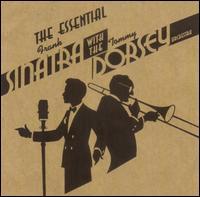
Frank Sinatra with the Tommy Dorsey Orchestra
THE ESSENTIAL...
RCA
In 1940, 25-year old Frank Sinatra was allowed out of his contract with the Harry James Orchestra and joined the more successful Tommy Dorsey Orchestra in January 1940 where he rose to prominence. In January 1942 Sinatra began working on his solo career by recording four songs with Dorsey trumpeter and arranger, Axel Stordahl, one of which was Cole Porter’s "Night and Day." It became a hit in March of that year, which resulted in Sinatra leaving Dorsey to strike out on his own the following September. During the interval, they along with the entire orchestra left an indelible imprint on 20th Century popular music that should not be forgotten.
The pairing was a great benefit to both men and their careers. Sinatra has a lovely, lilting voice that is wonderfully augmented by the slow swing of the orchestra led by Dorsey’s trombone and by Dorsey’s other vocalists, Connie Haines and The Pied Pipers quartet. Haines and The Pied Pipers appear on 12 of the songs. Sinatra’s sex appeal helped draw attention to Dorsey’s orchestra in a field crowded by the orchestras of Benny Goodman, Artie Shaw and Glenn Miller among others.
Over the course of their partnership, they performed songs by talented, now legendary, songwriters like Irving Berlin, Burke & Van Heusen, Sammy Cahn, Hoagy Carmichael, and Jerome Kern & Oscar Hammerstein II, and set them to brilliant arrangements. Sixteen Top Ten hits were created, including "I’ll Never Smile Again," "There Are Such Things," "We Three (My Echo, My Shadow and Me)," "Stardust," and "In The Blue Of The Evening," all of which appear on this set.
Most of the songs are ballads to which Sinatra melds his trademark crooning tenor. Two songs in this collection sound different from the formula. On "This Song Is You," Sinatra reaches for higher notes and holds them longer, slightly altering the sound we’ve come to expect from him. On "I’ll Take Tallulah," the restraints are taken off, allowing the band to cut loose and swing. It’s great to hear the drums poundin’ and horns wailin’. As good as the ballads are, these songs make you wish for more variety.
In the liner notes, Nancy Sinatra talks about remembrances of her father and godfather and Frank’s perspective. Sinatra historian, Charles L Granta details the importance of the relationship and how it shaped Sinatra. For example, Sinatra gave Dorsey credit as one of the primary influences of his phrasing.
This essential collection is comprised of 44 tracks that make up over two hours of big band bliss. It is amazing that these songs were recorded live without overdubs and is a testament to the talents of everyone involved. The Producer’s note explains that the recordings "were newly transferred and digitally restored from the original session Victor master discs and test pressings." They sound very crisp and clean and don’t sound over 60 years old.
Completists can find the entire studio works of Sinatra with Dorsey in the five-CD box set The Song Is You.
